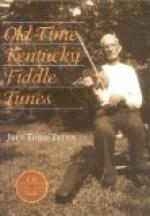“Pahdon, pahdon, please, Miss ‘Lethe,” said the negro. “I was thinkin’ of de sweet bimeby an’ waitin’ fo’ to tell de news to you—fust dat Ike got drunk an’ Marse Frank war gwine hab to scratch de mare—”
“Oh, dear! Oh, dear! Then Frank—why, he’ll lose everything!”
“Hol’ on, Miss ‘Lethe; dat de fust half, only. Secon’ half am dat Marse Cunnel found a jockey an’ Queen Bess am gwine ter run.”
“Bless his heart!” she cried. “I wonder if it’s wrong for me to pray that that jockey will win.” She looked, almost embarrassed at the aged negro for a moment, and then, mustering up courage, said: “Neb, look here. I’m ashamed to acknowledge so much interest in a horse-race, but it seems as if I can’t wait to hear of the result.”
“Lawsy, I don’t blame you, none; feel dat way mahse’f.”
“I must know the result the instant the race is decided.”
“Send yo’ wuhd right off, Miss ’Lethe.”
“Oh, I can’t wait for that. Neb, I never did such a thing before and never will again, and, even now, I won’t enter a race-track; but, Neb, isn’t there some place outside the fence where I could watch the race without actually going in?”
Neb doubled up in silent laughter. The old negro was enjoying life, exceedingly, on this, the day, which, for a time, had seemed so full of gloom. The white folks were quite at his mercy. “You bet dar is,” said he, “a knot-hole not fur f’m de gran’-stan’, an’ a tree what you could climb, right handy.”
Miss Alathea was not favorable to the thought of climbing trees, and said so. “No, no; the knot-hole will be far better for me.”
“But, Miss ’Lethe, why, de Cunnel—”
She did not let him make his explanation. “Sh! Sh!” she hissed. “Not a word of this to him, or anyone! Will you show me, when the time comes?”
“Oh, I’ll show you,” Neb replied, and before he had a chance to add a word she had hurried off into the crowd.
“I war gwine to tell her dat de Cunnel’d be dar, too, but she wouldn’t wait to heah. Wal, I reckon she’ll jes’ fin’ ’im when she git dar.”
Down the street his piccaninny band came straggling, looking for him.
“Hol’ on, chillun; hol’ on,” he cried, and joined them. “Now yo’ lissen. Yo’ is not to make a squawk until the end of de Ashlan’ Oaks. Yo’s to sabe yo’ bref to honuh ouah Queen Bess. If she wins, yo’ staht in playin’ ‘Dixie’ as yo’ nevuh played afo’. If she loses yo’s to play, real slow an’ mo’nful, ‘Massa’s in de Col’, Col’, Groun’.’”
In the meantime the Colonel, in a quiet spot, had joined the jockey who had been discovered to take the place of drunken Ike. The unknown rider was wrapped closely in an ulster, from beneath which riding boots, unusually small, peeped, now and then, as the feet within them moved somewhat nervously about.
“All right, are you?” he inquired.
“I ain’t afeared,” the jockey answered, “but I’m powerful nervous. Never had on clo’es like these before, an’—don’t you look at me!”




